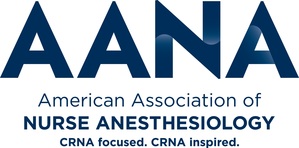American Association of Nurse Anesthesiology Applauds New Legislation to Lift VA Wage Cap
PARK RIDGE, Ill. , March 17, 2022 /PRNewswire/ -- The Consolidated Appropriations Act of 2022, signed into law by President Biden on March 15, includes legislation to increase recruitment opportunities for Certified Registered Nurse Anesthetists (CRNAs) in the Veterans Affairs (VA) health system.
The "VA Nurse and Physician Assistant RAISE Act," introduced last October by Rep. Lauren Underwood (D-IL), a member of the House VA Committee, lifts the pay cap for CRNAs and other advanced practice registered nurses (APRNs) working in the Veterans Administration. The American Association of Nurse Anesthesiology (AANA) worked closely with Rep. Underwood to include this important legislation in the broader spending package. The Appropriations Act also includes a $16 million increase in Title VIII funding, including a $4 million increase to the Advanced Nursing Education.
"The lack of full practice authority for CRNAs in the VA, as well as the current wage cap keeps CRNA pay significantly below private sector levels, has led to issues with CRNA recruitment and retention within the VA," said Dina Velocci, DNP, CRNA, APRN, AANA president. "The AANA applauds Rep. Underwood for her work on this legislation and the bipartisan support from both the House and Senate to help improve conditions for providers and our nation's veterans."
Of the legislation, Rep. Underwood said, "Increasing these pay limitations is the right thing to do for health professionals who make such enormous sacrifices to care for those who served our country. And it's also a critical step to ensure that our veterans have access to the highest quality care they deserve from the very best clinicians our country has to offer."
More than 1,100 CRNAs currently work in the VA, providing the highest quality care to our nation's veterans and serving on the frontlines of the ongoing pandemic. CRNAs have historically provided much of the anesthesia to our active-duty military in combat arenas since World War I and predominate in veterans' hospitals and the U.S. Armed Services, where they enjoy full practice authority in every branch of the military. CRNAs have been in high demand during the pandemic, due to their skill in ventilator and airway management, as well as anesthesia and pain management.
Title VIII programs receiving additional funds includes those marked for Advanced Nursing Education, Nurse Education, Practice, and Retention, Nursing Workforce Diversity initiatives and the Nurse Corp Scholarship and Nursing Faculty Loan Programs.
SOURCE American Association of Nurse Anesthesiology

WANT YOUR COMPANY'S NEWS FEATURED ON PRNEWSWIRE.COM?
Newsrooms &
Influencers
Digital Media
Outlets
Journalists
Opted In





Share this article